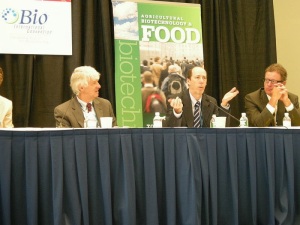Posted 22/10/2013 by Matthew Thomas

In recent years the number of highly technical policy issues considered by the Australian Parliament has increased. This means members and senators are obliged to grapple with the technical issues associated with all manner of topics, some of which have scientific or technological aspects.
But in order to reach a considered position and to have an authoritative basis for decision making, members and senators must achieve some grasp of these technical issues.
Thus, members and senators often find themselves in a difficult position—one that is shared by other non-experts: that is, that their ability to understand and reach a considered, informed judgement on the technical aspects of many debates is either limited or non-existent.
In this context, members and senators are, of necessity, reliant on the advice of experts and their expertise in areas as diverse as science, engineering, the law and economics.
This poses some problems, not least because in areas of public policy that have highly technical aspects it is frequently not clear who the relevant experts are. This situation is further complicated by the fact that experts often disagree and, with an increasingly educated and information-rich public, their claims are often contested.
In this environment there is clearly some need for a guide to expertise, such as that presented in the new Parliamentary Library Research Paper,
Expertise and public policy: a conceptual guide.
The paper provides guidance in three main ways. First, it gives some assistance in determining just who should be listened to in relation to the technical aspects of debates. Second, it indicates what members and senators—and non-experts more generally—are and are not able to do where it comes to assessing expertise and expert claims. And, third, it identifies ways in which non-experts’ ability to evaluate expertise and expert claims might be improved.
This FlagPost briefly considers the question, who is an expert in relation to the technical aspects of policy debates? But before doing so, it is necessary to clarify just what is expertise.
What is expertise?
The paper draws on the work of sociologists Harry Collins and Robert Evans to argue that expertise is an objective and tangible phenomenon. That is, it is the real and substantive possession of groups, with individuals gaining their expertise through their membership of these groups.
Although expertise is acquired through a social process—experts become experts through being socialised in a particular field of study—individuals may possess expertise regardless of whether or not others think they do.
As an objective and tangible phenomenon, expertise enables people to understand and do things that they could not understand or do before they gained their expertise. Further, people with expertise are able to do things that most other people cannot do.
Who are the experts?
The paper identifies a range of different forms of expertise, but argues that it is only those people who possess what can be called ‘interactional’ or ‘contributory’ expertise in an area who are able to fully contribute to the technical part of debates in that area. Both of these forms of expertise entail relevant experience in an area and not simply the accumulation of knowledge or learning of facts.
Interactional expertise involves mastery of the language of a specialist area, without actually being able to ‘do’ the activity. An example of this form of expertise might be a science journalist and blogger who is not a practicing scientist but, having been immersed in a particular field, is completely fluent in how it works and is able to communicate this to others. Contributory expertise, on the other hand, is the ability to do the activity with a high level of competence, and to actually make a contribution to the specialist area.
The paper shows that non-experts, because of their lack of specialist expertise, generally cannot contribute to the technical part of public policy debates: they are not in a position to judge what to believe. However, using what the paper describes as social expertise—that is, the sort of judgement that we use on a day-to-day basis in relation to friends, acquaintances, politicians etc.—non-experts are potentially able to judge who ought to be believed. Using social expertise, a non-expert might thus be able to make technical judgements about experts themselves and which of them ought to be believed.
There are a number of different strategies through which a non-expert may use their social expertise to evaluate experts’ credibility. The non-expert could consider questions such as does the expert seem credible? do they have the numbers on their side? are there any relevant interests or biases? and, what is the expert’s track record? Each of these strategies will be considered in further detail in a subsequent FlagPost, which examines the problem of how non-experts can go about deciding which expert to believe when they disagree in their judgements.
*Co-authored with Luke Buckmaster
Image source: Wikimedia Commons